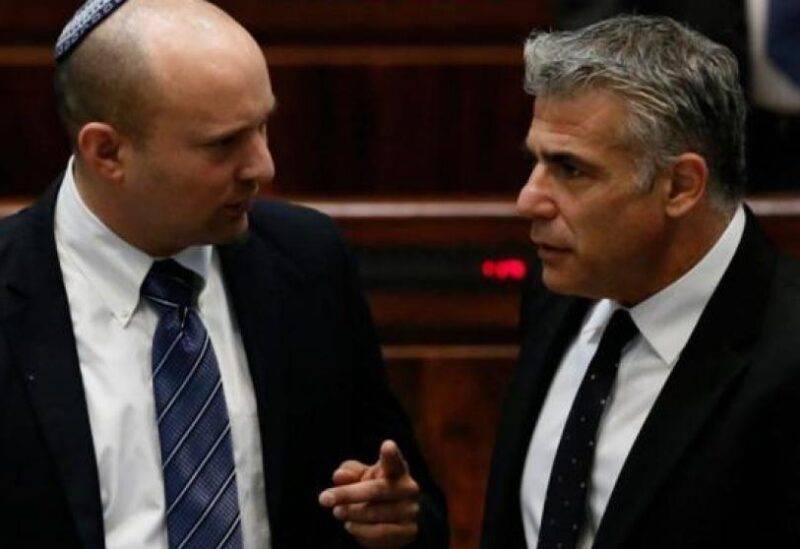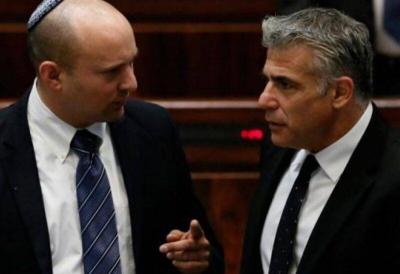Israel is approaching the end of an era after the announcement of a last-minute diverse coalition that could depose Benjamin Netanyahu, the longest-serving Prime Minister in the history of the Hebrew state. The United States has reaffirmed its steadfast support for Israel, regardless of the government in power.
This unprecedented coalition consists of eight parties—two from the left, two from the center, three from the right, and one Arab party—adopting contradictory positions on all issues except for the desire to remove Netanyahu from power. The Israeli parliament (Knesset) is expected to vote on the government's confidence within a week. However, Netanyahu has started to intensify his attempts to undermine the agreement from Thursday, hoping for last-minute splits within the coalition.
In a tweet breaking his silence since the agreement announcement, Netanyahu wrote, "All elected representatives supporting the right must oppose this dangerous leftist government." He urged his Likud party allies to "withdraw" their signatures "now." The support of right-wing ultra-nationalist leader Naftali Bennett, a former ally of the Prime Minister, has been crucial in forming the anti-Netanyahu coalition.
**Continuous Support**
Washington confirmed on Thursday that the United States will remain an ally of the Hebrew state in all circumstances, according to State Department spokesman Ned Price, who stated that the U.S. will maintain its "steadfast support" for Israel "no matter what and regardless of the government," emphasizing that "nothing will change even if the government does." The U.S. has also expressed its intent to assist in rebuilding Israel's missile defense stockpile, which was heavily utilized during the 11-day conflict with the Islamic Resistance Movement (Hamas) in Gaza in May.
Negotiations leading to this agreement persisted for several days amid rumors, pressures, and tensions. The news was announced at 11:25 PM on Wednesday, just minutes before a deadline. Yair Lapid, leader of the centrist "Yesh Atid" party, stated he "managed to form a coalition."
Supported by 61 members (out of 120), this agreement is expected to end a two-year political crisis, marked by four elections that resulted in no stable government formation.
**Bennett Then Lapid**
The crisis has led to polarization among Israelis, with some viewing this fragile alliance as a "betrayal" of right and left ideas, while others are relieved to see the steadfast Prime Minister on the verge of departure after over a decade in power. Chen Kostokovski, residing in Tel Aviv and participating in protests against Netanyahu, expressed, "We were losing hope, and after these very difficult two years, we finally hope to witness a new era that restores hope to Israel."
Netanyahu, currently facing trial in three corruption cases, is the first Israeli Prime Minister to face criminal prosecution while in office. He is expected to become a regular member of parliament again and will not be able to use his influence to push through protective legislation.
The signing of the coalition agreement on Wednesday evening by Naftali Bennett, wearing a yarmulke, and former television star Yair Lapid, who is now an intermediary, alongside Mansour Abbas, leader of an Israeli Arab party, marked a turning point in Israel's political history.
Israeli Arabs make up twenty percent of the Hebrew state's population. However, except for twice in 71 years, they have generally remained on the margins of political power. The inclusion of the United Arab List, led by Mansour Abbas, into a government coalition in Israel is a first for an Arab party in the country and is not supported by other Arab parties.
Abbas stated on his Facebook page, "We are signing a historic agreement to enter the government coalition that provides solutions to the pressing issues of our Arab community in exchange for the largest and broadest gains for our Arab community and substantial budgets." He viewed this move as solidifying the position of Arab parties as a legitimate and influential player in the political arena but does not intend to participate in this government.
Lapid reaffirmed on Wednesday that "this government will serve all citizens of Israel, including those who are not members of it, and will respect those who oppose it, making every effort to unite the various components of Israeli society."
Naftali Bennett, a former aide to Netanyahu who has become his competitor, is expected to be the first head of government until 2023, after which Yair Lapid will take over until 2025, according to Israeli media, unless this diverse and divided coalition collapses over issues related to the economy, security, and the sensitive relationship between state and religion, through defections.
The leftist newspaper "Haaretz" stated in its Thursday editorial that "forming (this government) is a historically significant event, but we can already anticipate a bitter, clichéd, and painful end to it."




